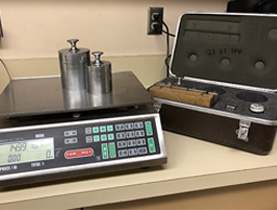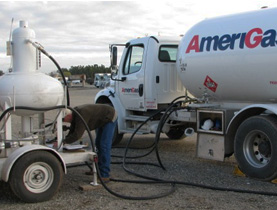Weighing and Measuring Devices
 The Glenn County Weights and Measures Division routinely checks the accuracy and type approval of commercial weighing and measuring devices that are used in transactions where the cost of a product or commodity is based on weight or measure. All weighing and measuring devices used in this manner must be registered annually within the county in which they are used, type approved for use in California, and tested for accuracy on at least an annual basis. Devices must test within the tolerances provided in the National Institute of Standards and Technology (NIST) Handbook 44.
The Glenn County Weights and Measures Division routinely checks the accuracy and type approval of commercial weighing and measuring devices that are used in transactions where the cost of a product or commodity is based on weight or measure. All weighing and measuring devices used in this manner must be registered annually within the county in which they are used, type approved for use in California, and tested for accuracy on at least an annual basis. Devices must test within the tolerances provided in the National Institute of Standards and Technology (NIST) Handbook 44.
 When a device is found to be out of tolerance it may be taken out-of-service, depending on whether it is over-registering (taking product) or under-registering (giving product). If red-tagged (placed out of service), that device is no longer legal to use until a Registered Service Agent corrects the device to be within tolerance and places it back in service (notifying our office in writing within 24 hours).
When a device is found to be out of tolerance it may be taken out-of-service, depending on whether it is over-registering (taking product) or under-registering (giving product). If red-tagged (placed out of service), that device is no longer legal to use until a Registered Service Agent corrects the device to be within tolerance and places it back in service (notifying our office in writing within 24 hours).
Some of the typical weighing and measuring devices we test:
- Hanging scales – mechanical scale typically found at fruit stands, farmer’s markets, and your local hardware store
- Counter scales – mechanical or electronic scale typically found at fruit stands, farmer’s markets, hardware stores, and perhaps a deli or butcher shop
- Computing scales – electronic scale typically used as a “point of sale” device to calculate a price based on total weight and the cost per unit of weight
- Livestock scales – mechanical or mechanical/digital scale usually used to determine the weight of livestock
- Platform scales – mechanical or mechanical/digital scale usually used when a counter or computing scale is too small. Typically used in feeds stores, processing facilities, and recycle centers
- Vehicle scales – mechanical or mechanical/digital scale used to determine the net and gross weight of a vehicle, loaded and unloaded, usually for bulk deliveries. Typically used by cattle trucks, bulk agricultural product carriers, and bulk agricultural commodity carriers
- Electric sub-meters – typically found where a business or establishment purchases electric service from a serving utility provider via a master meter and then distributes that service to tenants through a system of sub-meters
- Fabric, Cordage, Wire meters – device used to automatically measure the length of fabric, rope, wire, etc.
- Liquefied Gas meters – device used for the delivery and measurement of petroleum gas in the liquid state (i.e. propane)
- Retail Water meters – device used for the delivery and measurement of water as it is dispensed by a consumer
-
Retail Motor Fuel meters – device used for the delivery and measurement of liquid fuel (i.e. gasoline, diesel)
- Vapor sub-meters - device used for the delivery and measurement of hydrocarbon gas in the vapor state
How can you tell when and if a device has been checked for accuracy?
We conspicuously affix our county seal to every commercial device we test and find to be accurate.
Weighing and Measuring Device Links: